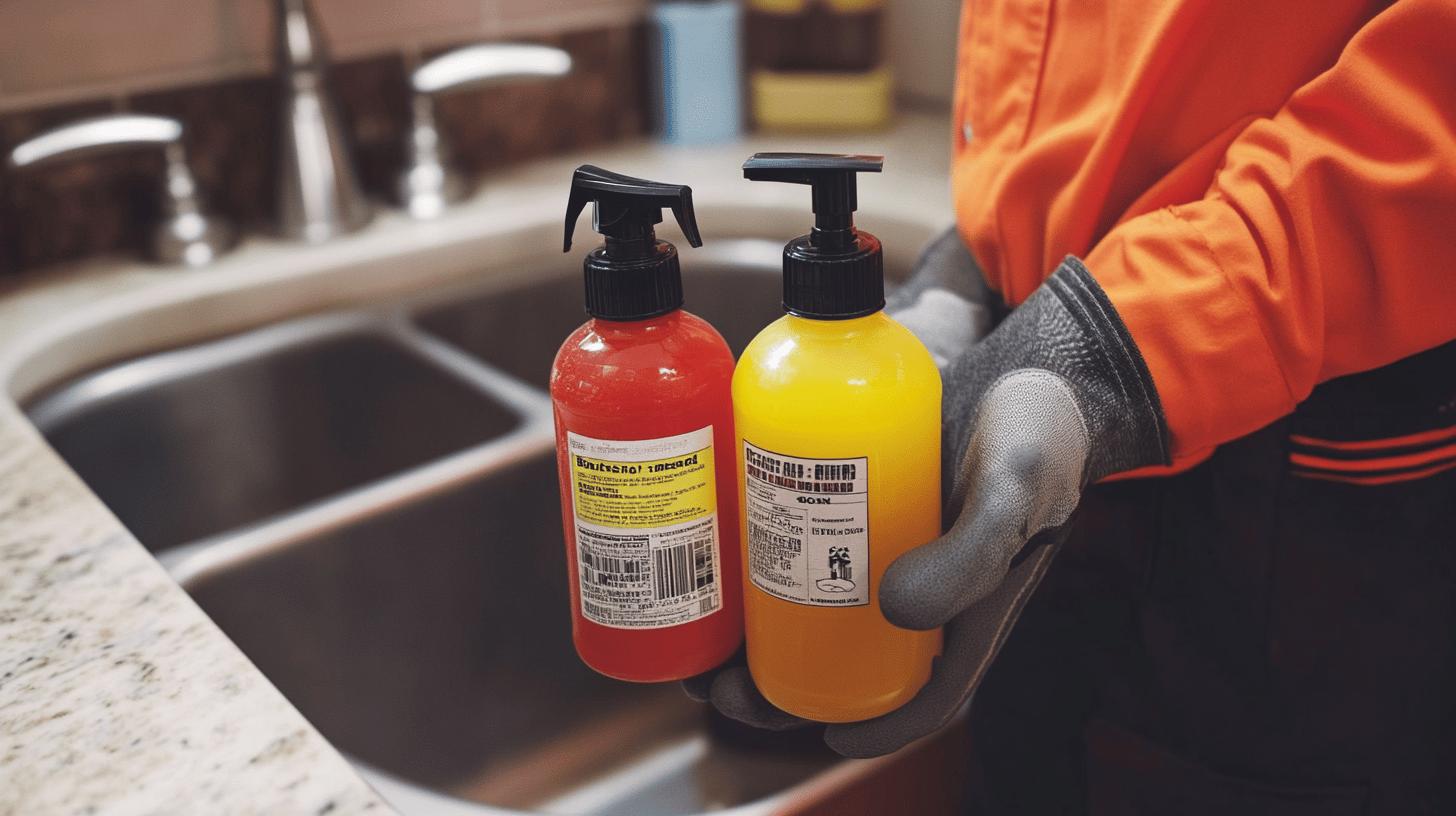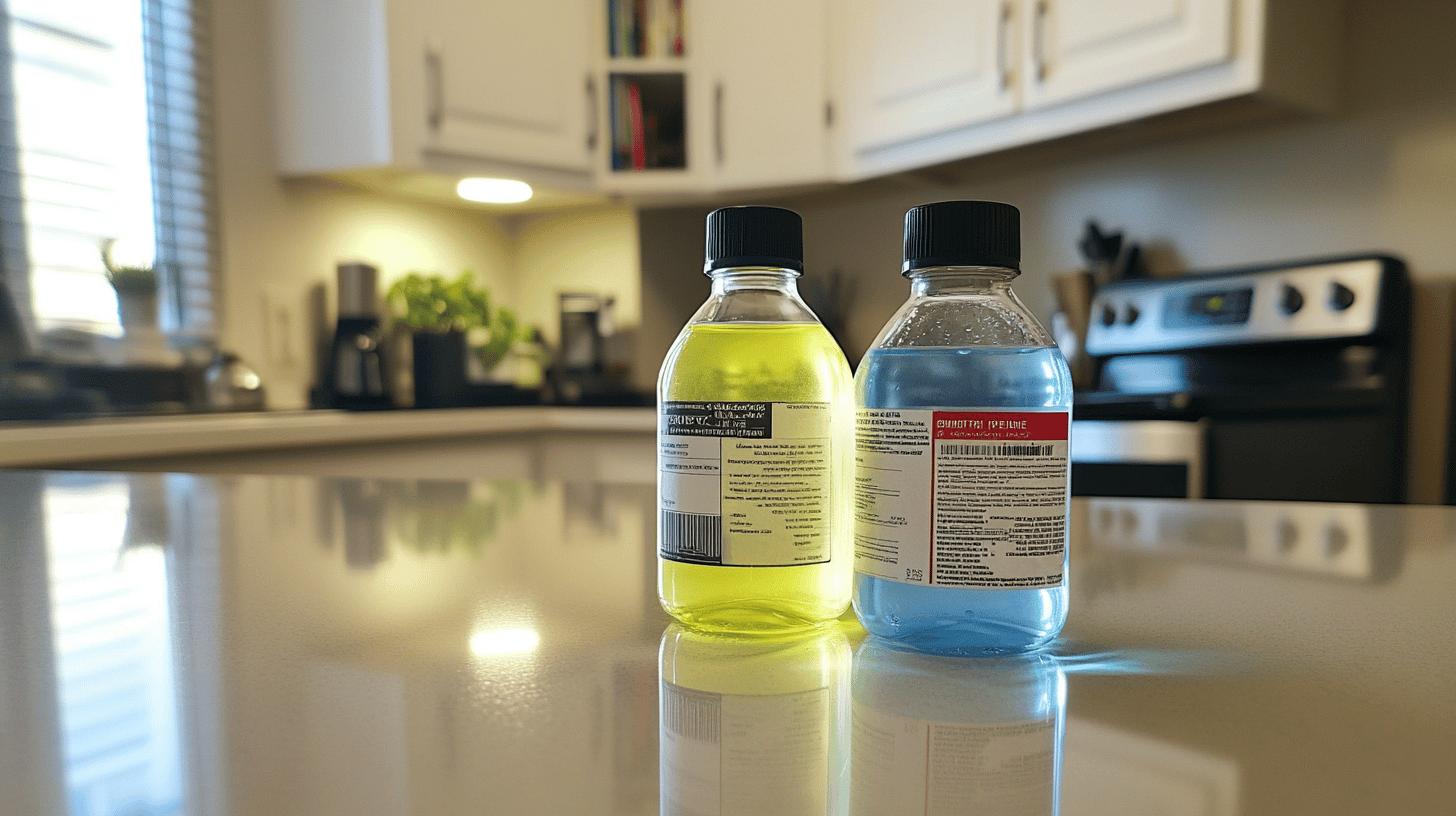TL;DR:
-
Types of Drain Cleaners:
- Acidic: Contain sulfuric acid, effective on hair and grease.
- Basic: Contain sodium hydroxide, effective on organic matter and food particles.
-
Safety Measures:
- Wear rubber gloves and goggles.
- Use long sleeves and ensure good ventilation.
- Don’t mix cleaners; follow instructions carefully.
-
Efficiency:
-
Acidic is faster, but corrosive to metal pipes.
-
Basic is gentler but can harm plastics.
-
Alternatives:
- BioClean (biodegradable), vinegar and baking soda, plungers, drain snakes, boiling water, and wet/dry vacuums are safer and environmentally friendly options.
-
Recommendation: Consult a plumber for tough clogs to avoid damage.
Drain cleaners can be either acidic or basic, depending on the formulation. Some cleaners contain sulfuric acid (an acidic solution) designed to break down tough clogs like hair and organic matter. The acid reacts with the material to dissolve it, but it can also corrode pipes, especially if used frequently or left in too long.
Other cleaners contain sodium hydroxide (a basic or alkaline solution), which is effective against grease, soap scum, and organic matter. Sodium hydroxide works by breaking down fats and oils, making them easier to clear. While it is less corrosive than sulfuric acid, it can still damage pipes over time if overused or improperly applied.
Understanding the type of drain cleaner you’re using is essential for safety. Acid-based cleaners can be very effective but more dangerous, while alkaline cleaners are gentler but may take longer to work. Always follow the manufacturer’s instructions and use these products sparingly to avoid damaging your plumbing system. If you’re unsure which cleaner to use, or if the clog persists, professional assistance might be the safest option.
Understanding the Chemical Nature of Drain Cleaners
Drain cleaners can either be acidic or basic, depending on the formulation. Acidic drain cleaners typically contain sulfuric acid, which is effective for breaking down stubborn clogs like hair and grease. However, the acidic nature of these cleaners can corrode pipes, especially if used too frequently or left in the drain for too long. On the other hand, basic drain cleaners usually contain sodium hydroxide (lye), which dissolves grease, soap scum, and organic matter. While alkaline cleaners are generally less corrosive to pipes compared to their acidic counterparts, they can still cause damage if used improperly or in excess. It’s important to follow the manufacturer’s instructions to minimize risks and ensure the safe use of these cleaners.
-
Acidic Drain Cleaners:
- Best for hair clogs
- Effective on grease
-
Basic Drain Cleaners:
- Good for organic matter
- Break down food particles
- Dissolve paper-based products
Understanding the properties of drain cleaners is essential for both effectiveness and safety. Acidic cleaners, while powerful, can break down tough clogs like hair and grease, but their strength can also damage pipes if not used properly. On the other hand, basic cleaners, which typically contain sodium hydroxide, are effective at dissolving grease and organic matter but can be caustic, so caution is needed to avoid harming your plumbing system.
Knowing the chemical nature of these cleaners allows you to choose the right product for the job, minimizing the risk of damaging your pipes. For severe or persistent clogs, it’s often best to consult a plumber. Professionals can offer safer, more effective solutions, ensuring a long-lasting fix without compromising your plumbing.
How Acidic and Basic Drain Cleaners Work

Acidic drain cleaners, like those containing sulfuric acid, use the power of strong acids to break down blockages. The acid reacts with the clog, typically made of organic materials like hair and grease, and burns away these substances by changing their chemical structure. While this process can effectively clear tough clogs, the strength of the acid can also pose risks to your pipes, especially if used improperly. Regular or excessive use of acidic cleaners can cause pipe corrosion, weakening the plumbing system over time.
The Mechanism of Basic Drain Cleaners
Basic cleaners use sodium hydroxide (or lye) to break down clogs. This strong substance reacts with fats and grease, turning them into soap-like material that’s easy to wash away.
|Type | Chemical Process | Effectiveness |
|—–|——————|—————|
| Acidic | Reacts with clog atoms | Effective on hair and grease |
| Basic | Saponification | Good for organic matter and grease |
These cleaners work fast but can be risky if not handled properly. The pH level of the cleaner affects how it interacts with pipes, so it’s important to know what you’re using. Both types are strong but can damage pipes—acidic cleaners can corrode metal, and basic ones can harm certain materials. If you’re dealing with a tough clog, it’s a good idea to call a plumber.
Safety Precautions When Using Drain Cleaners
When using drain cleaners, always wear safety gear to avoid chemical burns. Since they’re corrosive, gloves and goggles are a must to protect your skin and eyes.
- Wear rubber gloves to avoid direct contact.
- Use goggles to protect eyes from splashes.
- Wear long sleeves and pants to cover skin.
- Ensure good ventilation to avoid inhaling fumes.
- Do not mix different cleaners.
- Follow product instructions closely.
- Keep children and pets away during use.
Improper use and storage of drain cleaners can cause dangerous reactions. Keep them in a cool, dry place, away from other chemicals. Mishandling can damage your pipes and harm your health. Stick to safety guidelines to keep your home and well-being protected.
Comparing Acidic vs. Basic Drain Cleaners: Performance and Safety

Drain cleaners can be both acidic or basic, each with its own benefits and safety concerns. Acidic cleaners, such as those with sulfuric acid, are great for breaking down hair and grease. Basic cleaners, like those containing sodium hydroxide, work well on organic materials.
- Efficiency on Hair and Grease: Acidic cleaners work well.
- Against Organic Matter: Basic cleaners are better.
- Action Speed: Acidic solutions are quicker.
- Material Safety: Basic cleaners may be gentler on plumbing.
- Ease of Handling: Both need careful handling due to their reactive nature.
Safety Implications for Plumbing Materials
Both acidic and basic drain cleaners can be risky. Acidic cleaners can corrode metal pipes, like copper, leading to leaks, while basic cleaners can damage plastics and older metal pipes if misused. It’s best to consult professional plumbers, who can assess the situation and choose the safest solution. They also have advanced tools and techniques to handle tough blockages without causing damage, preventing further issues and costly repairs.
Exploring Alternatives to Chemical Drain Cleaners
Yes, there are alternatives to chemical drain cleaners. BioClean is one such option. It’s a biodegradable, non-toxic cleaner that targets organic waste. Unlike traditional chemical cleaners, BioClean is safe for humans, animals, and plumbing. It uses natural enzymes to break down materials gently, offering an effective solution without harmful chemicals.
For natural and mechanical solutions, consider:
-
Vinegar and Baking Soda: Helps dissolve minor clogs. Mix equal parts and pour down the drain.
-
Plunger: Often dislodges clogs, restoring drainage, especially in sinks and toilets.
-
Drain Snake: Reaches deep into pipes to remove hair or debris.
-
Boiling Water: Melts grease and clears smaller clogs.
-
Wet/Dry Vacuum: Sucks out debris without chemicals.
These natural solutions not only benefit the environment but also reduce the risks to your plumbing. They’re safer and less likely to cause damage compared to harsh chemicals, while mechanical methods avoid corrosion altogether. By opting for these alternatives, you protect your pipes and support a more sustainable home. For more stubborn clogs, though, a professional plumber’s expertise ensures a thorough fix without causing further damage.
Final Words
Understanding whether a drain cleaner is an acid or a base helps you make safer and more effective choices for your plumbing. Both acidic and basic cleaners have their benefits, but it’s crucial to prioritize safety to avoid harm to both yourself and your pipes. Exploring alternatives like biodegradable options can provide effective results while reducing risks. Armed with this knowledge, you’ll be better prepared to tackle clogs safely, keeping your drains clear and your plumbing in good condition.
FAQ
Is Drano an acid or a base?
Drano is a base. It contains sodium hydroxide, which is effective in dissolving grease and organic clogs.
What is the pH of a drain cleaner?
Drain cleaner pH varies. Acidic cleaners have a lower pH, while basic cleaners like Drano have a higher pH, often around 13 or 14.
Is hand soap an acid or base?
Hand soap is typically a mild base, formulated to clean skin without causing irritation.
Is household ammonia an acid or base?
Household ammonia is a base. It is used for cleaning purposes due to its ability to dissolve grease and dirt.
Is blood an acid or base?
Blood is slightly basic, with a normal pH level around 7.4, which is important for maintaining proper bodily functions.
Is milk an acid or base?
Milk is slightly acidic, with a pH around 6.5 to 6.7, due to its lactic acid content.
Is vinegar an acid or base?
Vinegar is an acid, containing acetic acid, and has a pH around 2.5, useful for cleaning and culinary purposes.
Is drain vinegar an acid or base?
Drain vinegar is acidic, often used as a natural cleaning solution due to its acetic acid content.
Is cleaner an acid or base?
Cleaners can be either acidic or basic, depending on their composition and intended use.
Is sulfuric acid found in acidic drain cleaners?
Yes, sulfuric acid is commonly found in acidic drain cleaners, effective for dissolving hair and grease clogs.

